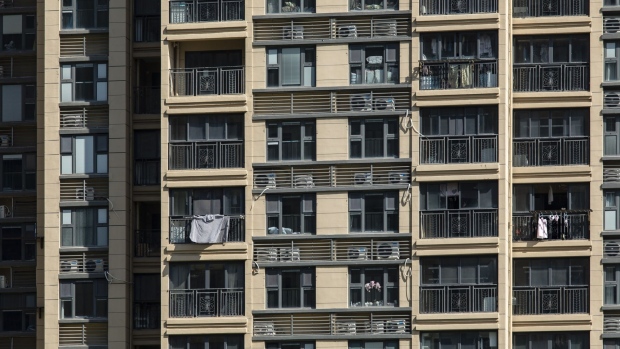CAPITALI$M WITH CHINESE CHARACTERISTICS
China Shadow Banks Snap Up Property to Rescue Own Investments
, Bloomberg News
(Bloomberg) -- China’s shadow banks are emerging as unlikely white knights for embattled property firms by becoming mini-developers themselves.
Trust companies including MinMetals Trust Co. and Zhongrong Trust Co. have bought stakes in at least 10 real estate projects this year, betting that the unfinished homes will eventually yield cash to pay off some of the $280 billion in property-backed funds sold by trusts to investors.
The push by these lenders to get into the real estate business offers some relief for investors and developers in the wake of China’s property collapse that has rattled global markets and led to more than a dozen defaults. The moves free up cash to help real estate firms tackle some of their $3.4 trillion in liabilities.
The shadow banks are doing these deals now, knowing creditors may have limited room to negotiate payments or deals with developers like China Evergrande Group once restructuring plans are announced, according to one trust executive.
“Taking up property projects during an enduring downturn is more about saving themselves,” said Zhu Yiming, a property analyst at China Real Estate Information Corp., referring to the trusts. Rather than await credit improvement, “it’s better for trusts to regain the initiative through getting a controlling stake.”
China Evergrande, the country’s most-indebted developer that’s at the center of the property crisis, is among firms unloading housing projects. The Shenzhen-based company sold stakes in at least seven housing developments to three trust firms. Pricing details weren’t disclosed, though Evergrande said it recovered its initial capital contribution of 2 billion yuan ($300 million) and settled trust liabilities of 7 billion yuan with the sales.
State-owned AVIC Trust, the second-largest trust lender to Evergrande as of June 2020, took control of two residential projects from Evergrande in March. They include Sunny Peninsula, a stalled seaside development in Guangzhou slated to house 5,000 families. Logan Group Co., which was cut deeper into junk this month, and Zhenro Properties Group Ltd. are among other developers selling projects to trusts.
Evergrande said in an investor call last week that transferring some investments and deferring housing operations has become a “new model” of cooperation with trust companies. MinMetals Trust said adding development stakes is the “optimal option” of dissolving Evergrande debt risk, while helping get the projects back on track.
Here are some recent deals:
Local governments are pushing creditors, including trusts, to help distressed developers like Evergrande offload stakes in projects and find strategic investors to raise cash, according to people familiar with the matter. The most pressing concern for authorities is to ensure housing construction, and many trusts are considering taking additional stakes in Evergrande projects, said the people, who declined to be identified discussing private matters.
The trust industry has plenty at stake in the ongoing property woes. The shadow banks have more than $3 trillion outstanding in high-yield products sold to wealthy individuals, including about $280 billion backed by developers like Evergrande. Evergrande defaulted in December, and is headed for one of the largest debt restructurings ever in China. Its bonds due in 2025 trade at about 13 cents on the dollar.
China’s crackdown on borrowing combined with a slowdown in the housing market contributed to a surge in missed payments on these investment vehicles. Defaults on property-linked funds jumped to 92 billion yuan last year, accounting for more than 60% of the total, according to research provider Use Trust. That sparked protests in several cities as buyers demanded repayment on what were supposed to be safe, short-term investments.
Though the developers are ultimately on the hook for these products, trusts are trying to make investors whole since they pitched the securities to investors in many cases.
“In theory, it’s individual buyers of trust products who should bear the loss of missed repayments,” said Lan Wang, an analyst at Moody’s Investors Service. “But in reality, sometimes trust firms still need to compensate investors, especially if their sales behavior was inappropriate.”
Pressure is mounting. About 352 billion yuan of property-related trust products mature by September, according to Moody’s. Growing concerns over developers may limit the trusts’ ability to refinance these products.
“The moves by trust firms to take over property projects may help dissolve risks on real estate lending,” said Shuai Guorang, a researcher at Use Trust. “But they also bear risks, given the property market hasn’t bottomed out.”
©2022 Bloomberg L.P.
No comments:
Post a Comment